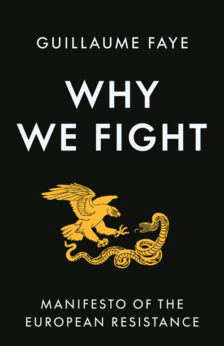Destructive Departure in Worldview Warfare is a concept that I first introduced in my essay “Black Sunrise” published in the anthology Lovers of Sophia (2017) and then expanded upon in both Prometheism (2020) and Closer Encounters (2021). It is a concept best conceived in the German language and translated back into German it is Abbauender Aufbruch im Weltanschauungskrieg. Abbau is the term that Heidegger introduced for “deconstruction.” Before it was debased by postmodern thinkers such as Derrida, Deconstruction was a concept that Heidegger developed. It was specifically in the context of the deconstruction of the history of Western ontology. It comes from the German verb bauen, which means to build, so it is literally a “dismantling.” Aufbruch is a “breakthrough” or “departure,” for example a breakthrough in the context of scientific research and development. Something that is not just a development on a linear trajectory but a breakthrough that brings about a sudden change and opens up radical new possibilities. It is a kind of catastrophe, a singularity. Aufbruch also signifies a “breakout” or “breakaway” as a consequence of a discovery of that nature. When one comes upon these major breakthroughs in scientific research and development, they can lead to a breakout from an established pattern of life with socially or politically revolutionary consequences. So Abbauender Aufbruch is a “dismantling departure” or a deconstruction as a consequence of a breakthrough.
Then we have im Weltanschauungskrieg or “in Worldview Warfare.” Weltanschauungskrieg is the term that, in 1945, the American occupiers discovered that the Germans had been using for what the United States wound up translating as “Psychological Warfare.” The American term “Psychological Warfare” is a mistranslation, by American Military Intelligence, of the German term Weltanschauungskrieg. It is a mistranslation because “Psychological Warfare” implies that there is an objective reality, a kind of physical and biological reality, which the human organism is a part of, and psychological warfare is about manipulating the subjective states of entities (namely human beings) in objective reality.
That is not what Weltanschauungskrieg means. To understand Weltanschauungskrieg we need to go all the way back to thinkers like Schelling and Nietzsche with his perspectival ontology and then ultimately Heidegger. It is a question of a war over the nature of ‘reality.’ A Weltanschauung is not a “worldview” that is merely a subjective projection onto an objective world. As Schelling already understood, Welt–anschauung (literally “world en-showing”) is “the way that the world shows itself.” There is an idea in Schelling and then later, more prominently, in Nietzsche, that different forms of life struggle over the very definition of reality. They try to shape the manifestation of the world in a way that suits their vital interests, and there is a fundamental ontological struggle between psycho-biological forces in Nature. This idea is laid out at length in the chapters “Worlds at War Over Earth” and “Being Bound for Freedom” in Prometheus and Atlas (2016).
William James called this a “pan-psychic perspectivism” in a “pluralistic universe.” In the context of Nietzsche, it has been characterized as a perspectival ontology, in other words, an account of Being wherein there is no God’s eye view over everything but only a multiplicity of different perspectives of various forms of life vying with one another to define ‘reality’ in terms that suit their own will to power. Ultimately, this idea goes back to Heraclitus who writes that “War is father and king of all” and that “Conflict is Justice; all things come to pass and are ordained in accordance with Conflict.” In other words, there is a fundamental metaphysical strife in the Cosmos, which is an eruption of the lava of Chaos that is the background of cosmic order.
A Destructive Departure in Worldview Warfare is a moment wherein a group of people first become conscious of the fact that there has been this worldview warfare, amongst various societies and cultures and between clashing civilizations. For the first time they become aware of the nature of being captivated by a worldview. As a result, they are able to step outside of the worldview that has captivated them – not by stepping into a neutral and objective perspective, which is impossible, but as Nietzsche put it when describing the psychology of the Superman, to be able to flip back and forth between a variety of perspectives and to use them in order to broaden one’s scope of masterful action and dominance.
Destructive Departure in Worldview Warfare is the moment when there is a departure, breakout, or breakaway from being blindly captivated by a particular worldview that one has ancestrally inherited, recognizing these other possibilities of experiencing the world, and having the dynamism to manipulate those possibilities. This confers control over societies that are still acting blindly and unconsciously. That brings us back to the very first element, the Abbau – the “deconstruction” or “dismantling.” When one achieves that perspectival power that Nietzsche sees as characteristic of the Übermensch, one also finds oneself in a position to deconstruct societies that one wishes to conquer. Their unconsciousness of the way in which they are captivated by one or another worldview can be used to introduce forces of social decay, disintegration, and dissolution in order to put the target population in a place of hopelessness, despair, and disorientation. Then, a new point of orientation can be provided to this demoralized population, who are prepared to be wholly captivated by what orients them anew and by those “saviors” who, in an apparently miraculous manner, deliver them from an unbearably nihilistic disorientation.
Various forms of life have a psychical and vitalistic interest in shaping ‘reality’ in a way that serves not only their survival but the increase of their power and scope of effective action. This is what Nietzsche meant when he talked about a metaphysics of the will to power, based on a critique of Darwin’s claim that Nature is geared toward mere “survival.” Evolution is driven, rather, by a will toward the increase in power and dominance. There is no objective truth because things are only the way that they are from the perspective of a certain form of life with its own psycho-biological interests.
Worldview warfare is the war between various forms of life, which could be whole societies, over the constitution of reality. What that further implies is that all systems of knowledge are conditioned by power relations. This includes every type of scientific theorization. Science is political through and through. It is not only used for political purposes or distorted by them. Rather, as explained in the chapter on “The Spectral Revolution” in Prometheus and Atlas, every scientific paradigm is radically political in its motivations and in the ways in which it wants to define and control life.
Worldview warfare has been unconsciously carried out by every society against every other society throughout the course of history. However, at a certain point, when a Nietzsche or a Heidegger can become conscious of the fact that we have always been engaging in a war of worldviews, there is a possibility that opens up that was hitherto foreclosed to us. This is the possibility that we could engage in worldview warfare consciously rather than unconsciously. That is not to say that we can assume an absolute perspective, which would be a contradiction in terms. It does not mean that we can gain a proverbial “God’s eye view” over the world, but it means that we can force ourselves to adopt many different perspectives and be dynamic enough to play with various ways of looking at the world – various paradigms – for the purposes of increasing our scope of control. This represents a breakthrough in paradigmatic thought and attendant theorization.
One of the senses of the word Aufbruch in German is “breakthrough” in the way we mean it when we talk about a breakthrough in scientific research or technological innovation. In other words, something that is not an incremental advance but is a radical development by comparison to what came before it. That breakthrough, such as the breakthrough that we achieved when we developed nuclear fission, also gives us the possibility for a break away. Revolutionary discoveries allow for a significant departure, on a social level, from the various forms of life that we have customarily adhered to. Breakthroughs can lead to breakaways on a psychological and social level. That is another sense of the word Aufbruch in German.
Consequently, this concept that I have developed, and translated back from English into a putatively original German form as Abbauender Aufbruch im Weltanschauungskrieg, could be alternatively rendered as “deconstructive breakthrough in worldview warfare” or as “destructive breakaway in psychological warfare.” It is a revolutionary breakthrough that leads to a breakout from customary human forms of life and the parameters within which worldview warfare has been conducted amongst human societies throughout the course of recorded history. Abbauender Aufbruch is a “dismantling breakthrough” or a deconstruction that leads to a radical departure. Entering postmodernity – moving out of the modern paradigm – is a moment when a deconstruction takes place that allows us to consciously recognize for the first time that, regardless of what society has given us as our respective heritage, we have all been unconsciously operating within the context of one or another worldview.
The kind of deconstruction that takes place in Nietzsche and Heidegger marks a unique historical moment wherein, for the first time, we become conscious of this, which in turn gives us the power to deliberately adopt various worldviews and flip back and forth between them in order to increase our latitude of control and enhance our power or vital force. This allows one to dominate in Weltanschauungskrieg in a fundamentally new way, by finally becoming a conscious combatant and by being the only people who are consciously engaged in this struggle to define reality on account of being the only ones to have deeply undergone a deconstruction or dismantling of the paradigms and ideologies that had hitherto been blindly adhered to by one’s own society and that the cultures of one’s enemies are still captivated by unconsciously. Abbauender Aufbruch im Weltanschauungskrieg is a deconstructive departure from the unconscious ideological war that has taken place between cultures and nations throughout the course of history for the sake of a hyper-dimensional conquest.
It is a question of becoming a master over occultation and revelation. Once one realizes that alethea (un-concealment or dis-closure) is the proper conception of Truth, not veritas (representational verisimilitude), one can make things disappear by becoming a master of what remains occulted and what is revealed or reified from out of that occulted “background” (what Heidegger called abgrund). Destructive Departure is not just an abstract concept. In fact, I have reconstructed the concept based on how it is being practically implemented – irrespective of whether those who are implementing it actually have a conceptual grasp of their modus operandi.
Purchase Philosophy of the Future here.








